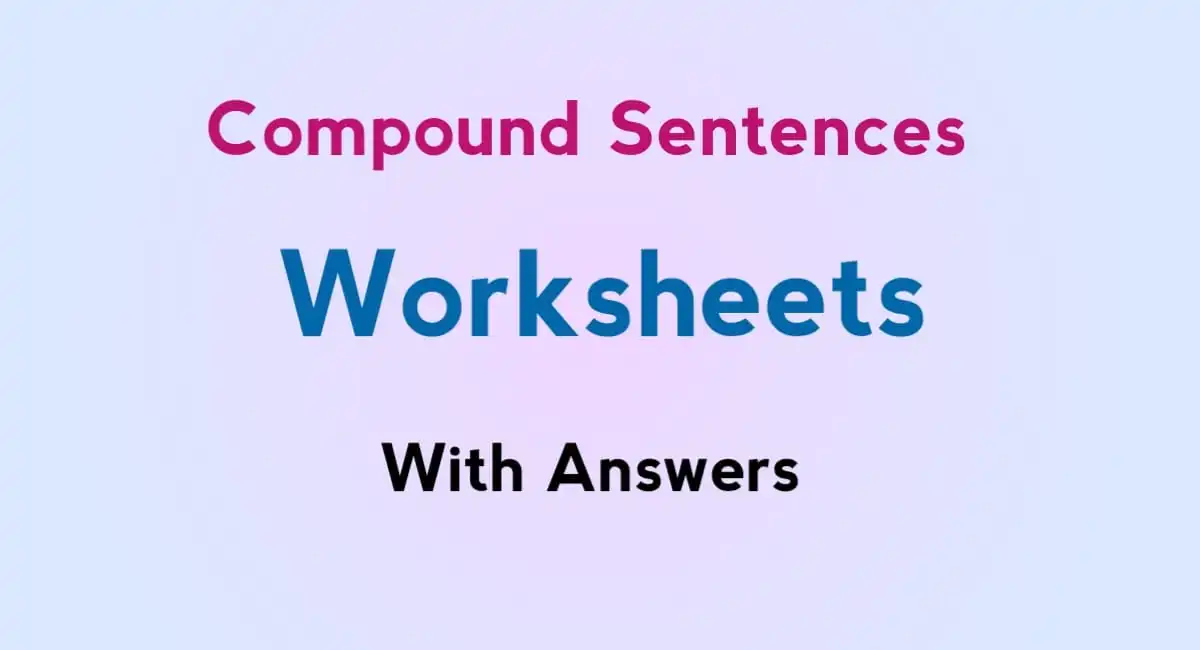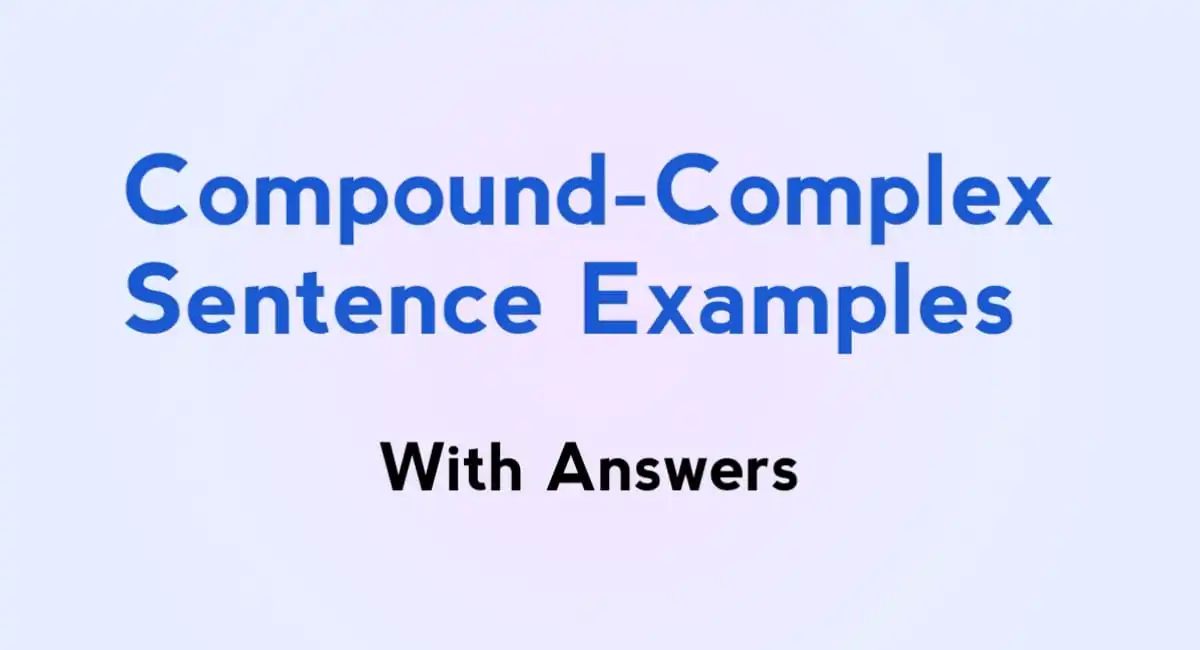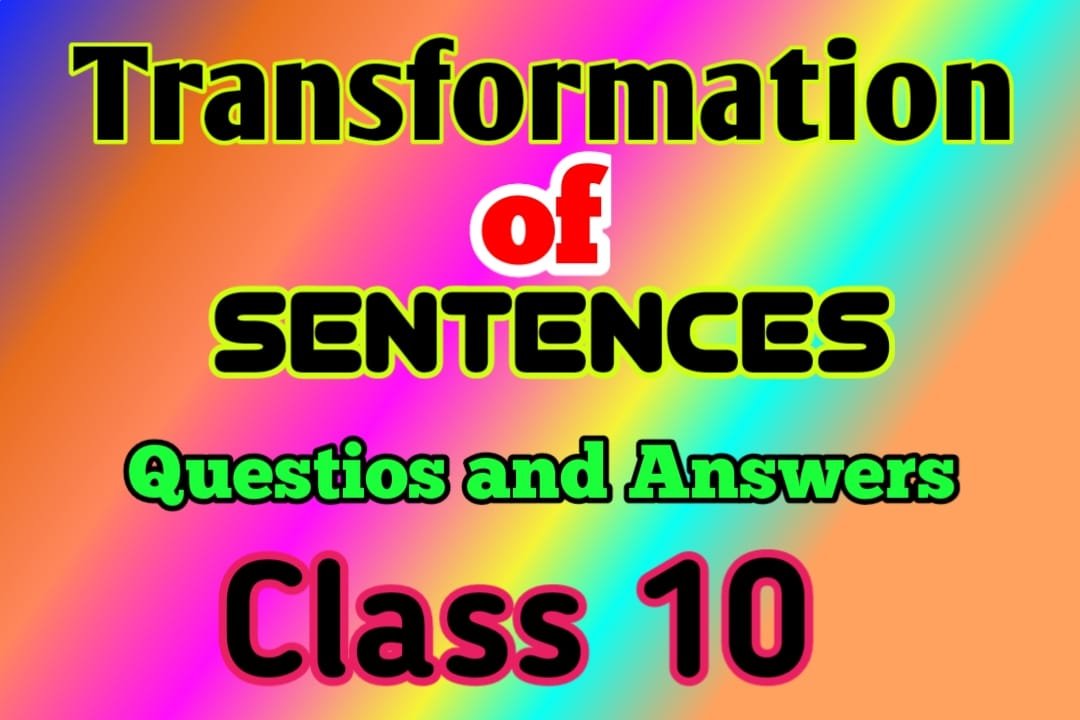Explore the world of Compound Sentences Worksheets with Answers in this comprehensive guide. Unlock the secrets of crafting compound sentences with ease.
Welcome to the fascinating world of compound sentences! If you’re looking to enhance your understanding of sentence structure and improve your writing skills, you’re in the right place.
In this article, we’ll delve deep into Compound Sentences Exercises Worksheets with Answers, providing you with valuable insights, tips, and exercises to master the art of constructing complex sentences.
Compound Sentences Meaning
Before we dive into the worksheets and answers, let’s clarify what compound sentences are.
A compound sentence is formed when two or more independent clauses are combined using coordinating conjunctions like “and,” “but,” “or,” “nor,” “for,” “so,” and “yet.”
Examples:
1. She loves to read books, and she enjoys hiking.
coordinating conjunction: and
Independent clauses: She loves to read books. She enjoys hiking.
2. I wanted to go to the movies, but I had to finish my homework first.
coordinating conjunction: but
Independent clauses: I wanted to go to the movies. I had to finish my homework first.
People also ask
| Join into simple sentences | Join into Compound Sentence |
| Join into Complex Sentence Examples | Class 9 Transformation of Sentences Worksheet |
Compound Sentences Worksheets with Answers
Before starting Compound Sentences Worksheets, go through the following parameters that will help to complete the worksheet easily.
Independent clause
An independent clause, also known as a main clause, is a group of words that contains a subject and a verb and expresses a complete thought.
Examples:
1. We visited the museum and learned about history.
This sentence consists of two independent clauses connected by the coordinating conjunction “and”: “We visited the museum” and “learned about history.”
2. She worked hard, and she earned a promotion.
Here, “She worked hard” and “she earned a promotion” are two independent clauses connected by the coordinating conjunction “and.”
Dependent clause
A dependent clause, also known as a subordinate clause, is a group of words that has a subject and a verb but does not express a complete thought on its own. It relies on an independent clause (main clause) to make sense and convey a complete idea.
Examples:
1. Because it was raining, I decided to stay indoors.
Dependent clause: “Because it was raining”
This clause doesn’t express a complete thought by itself. It depends on the independent clause “I decided to stay indoors” to make sense.
2. When she arrives at the airport, we will pick her up.
Dependent clause: “When she arrives at the airport”
This clause provides additional information about the time of the action but doesn’t form a complete thought independently.
Coordinating Conjunctions
Coordinating conjunctions play a vital role in creating compound sentences. There are seven primary coordinating conjunctions:
1. For
2. And
3. Nor
4. But
5. Or
6. Yet
7. So
These conjunctions are used to join independent clauses in a way that makes sense and maintains coherence in your writing.
Building Compound Sentences
Now that we’ve covered the basics, let’s put them into practice. Here’s a step-by-step guide to building compound sentences:
1. Identify two or more independent clauses in your writing.
2. Choose an appropriate coordinating conjunction to connect them.
3. Use a comma before the coordinating conjunction (except when both clauses are short).
Compound Sentences Worksheets 1
1. Find out the conjunction and independent part of sentences (independent clauses) from the following compound sentences.
1. I wanted to go to the movies, but I didn’t have enough money.
2. She enjoys hiking, and he prefers biking.
3. They had to finish the project quickly, so they worked late into the night.
4. He studied hard for the exam, yet he didn’t perform well.
5. I can either have pizza for dinner, or I can make a sandwich.
6. She not only completed the marathon, but she also set a new record.
7. The concert was postponed due to bad weather, for the safety of the attendees.
8. He enjoys playing basketball, so he joined a local team.
9. You can visit the museum today, or you can go to the zoo tomorrow.
10. She not only excels in academics, but she is also a talented musician.
Compound Sentences Worksheets 2:
2. Combine each of the following sentences into compound sentences with the conjunction given in brackets.
1. She loves to travel. She dreams of exploring every continent. (and)
2. The team practiced diligently. They couldn’t win the championship. (yet)
3. You can choose a blue dress. You can opt for the red one. (or)
4. He was tired. He had been working all night. (for)
5. They had to finish the project quickly. They divided the tasks. (so)
6. She worked hard. She earned a promotion. (and)
7. He couldn’t decide between the two desserts. He ordered both. (so)
8. You can come to the party. You can stay home and relax. (or)
9. She tried her best. She couldn’t pass the exam. (but)
10. He enjoys swimming. He’s afraid of deep water. (yet)
Compound Sentences Worksheets 3:
3. Put the proper punctuation mark in the following compound sentences.
1. I wanted to go to the store but it started raining.
2. She studied all night for the exam consequently she aced it.
3. They went to the park and they had a picnic.
4. John loves playing basketball his brother prefers soccer.
5. I enjoy cooking so I decided to take a culinary class.
6. The movie was sold out so we watched a play instead.
7. He didn’t like the movie yet he stayed until the end.
8. Sarah is allergic to cats however she adopted a kitten.
9. She loves to read books so she spends her weekends at the library.
10. The team worked hard all season therefore they deserved to win the championship.
Compound Sentences Worksheets 4:
4. Fill in the blanks with proper conjunction to complete the sentences.
1. She wanted to go to the party ______ had too much work to finish.
2. The movie was long and boring ______ we left early.
3. I enjoy reading novels ______ my brother prefers watching movies.
4. They couldn’t decide on a restaurant______ they ended up ordering pizza.
5. He studied hard for the exam______ he didn’t perform well.
6. She loves to swim ______ she joined the local swimming club.
7. We had a picnic in the park ______ it was a beautiful day.
8. I needed to buy groceries ______ I forgot my shopping list at home.
9. The cat was asleep on the couch ______ I decided to be quiet.
10. ______ finishing their homework, the kids went outside to play.
Compound Sentences Worksheets 5:
5. Split the following sentences into two.
1. He wants to travel to Europe, and he’s saving money for the trip.
2. She likes to jog in the morning, yet she prefers yoga in the evening.
3. You can order the dish with or without spicy sauce.
4. The concert was canceled, for the lead singer fell ill.
5. He enjoys hiking, and he often explores challenging trails.
6. She was excited, but she tried to remain calm and composed.
7. The team won the match, so they celebrated their victory with enthusiasm.
8. He not only aced the exam, but he also received a scholarship.
9. She was tired, yet she continued to work on her project diligently.
10. You can go to the beach this weekend, or you can plan a hiking trip.
Compound Sentences Worksheets 6:
6. Join the following sentences into compound sentences.
1. John is allergic to peanuts. He always checks food labels carefully.
2. The teacher was not there. The servants were not there. They know nothing.
3. You may agree. You may refuse. I shall certainly try to win. My honour depends on it.
4. I could not carry out his orders. I did not inform him of my inability in time. So he was displeased with me.
5. He studied hard for the exam. He still didn’t get a good grade.
6. I was not present at the time. I have heard about the matter. This is a serious affair. I consider it my duty to report it to you.
7. He went to Darjeeling. His brother also went there. I often met them at the Mall. We walked together.
8. I am very much worried. Ram has not come. Jatin has not come. All my things are with them-
9. He stood first in the examination. He had been ill before. This was certainly a great credit for him. It deserves all praise.
10. The weather was hot and humid. We decided to go swimming at the beach.
Compound Sentences Worksheets Answers
Answers Key 1
1. I wanted to go to the movies, but I didn’t have enough money.
Conjunction: but
In this sentence, “but” is used to join two independent clauses, indicating a contrast between the desire to go to the movies and the lack of funds.
2. She enjoys hiking, and he prefers biking.
Conjunction: and
The coordinating conjunction “and” is used to connect two independent clauses, highlighting the different preferences of “she” and “he.”
3. They had to finish the project quickly, so they worked late into the night.
Conjunction: so
“So” is used to show cause and effect, connecting the need to finish the project quickly with the action of working late.
4. He studied hard for the exam, yet he didn’t perform well.
Conjunction: yet
“Yet” is used here to indicate a contrast between the effort put into studying and the disappointing exam performance.
5. I can either have pizza for dinner, or I can make a sandwich.
Conjunction: or
The coordinating conjunction “or” presents a choice between having pizza or making a sandwich for dinner.
6. She not only completed the marathon, but she also set a new record.
Conjunction: but, also
In this sentence, “but” and “also” are used to emphasize two related achievements—completing the marathon and setting a new record.
7. The concert was postponed due to bad weather, for the safety of the attendees.
Conjunction: for
“For” is used to provide a reason for the postponement of the concert, emphasizing the safety of the attendees.
8. He enjoys playing basketball, so he joined a local team.
Conjunction: so
Here, “so” indicates a cause-and-effect relationship between his enjoyment of basketball and his decision to join a local team.
9. You can visit the museum today, or you can go to the zoo tomorrow.
Conjunction: or
The coordinating conjunction “or” presents two options—a visit to the museum today or a trip to the zoo tomorrow.
10. She not only excels in academics, but she is also a talented musician.
Conjunction: but, also
“But” and “also” are used to highlight two distinct qualities—academic excellence and musical talent—possessed by the subject.
Answers Key 2
1. She loves to travel, and she dreams of exploring every continent.
2. The team practiced diligently, yet they couldn’t win the championship.
3. You can choose a blue dress, or you can opt for the red one.
4. He was tired, for he had been working all night.
5. They had to finish the project quickly, so they divided the tasks.
6. She worked hard, and she earned a promotion.
7. He couldn’t decide between the two desserts, so he ordered both.
8. You can come to the party, or you can stay home and relax.
9. She tried her best, but she couldn’t pass the exam.
10. He enjoys swimming. He’s afraid of deep water. (yet)
Answers Key 3
1. I wanted to go to the store, but it started raining.
2. She studied all night for the exam; consequently, she aced it.
3. They went to the park, and they had a picnic.
4. John loves playing basketball; his brother prefers soccer.
5. I enjoy cooking, so I decided to take a culinary class.
6. The movie was sold out, so we watched a play instead.
7. He didn’t like the movie, yet he stayed until the end.
8. Sarah is allergic to cats; however, she adopted a kitten.
9. She loves to read books, so she spends her weekends at the library.
10. The team worked hard all season; therefore, they deserved to win the championship.
Answers Key 4
1. She wanted to go to the party but had too much work to finish.
2. The movie was long and boring, so we left early.
3. I enjoy reading novels, and my brother prefers watching movies.
4. They couldn’t decide on a restaurant; therefore, they ended up ordering pizza.
5. He studied hard for the exam, yet he didn’t perform well.
6. She loves to swim, so she joined the local swimming club.
7. We had a picnic in the park, and it was a beautiful day.
8. I needed to buy groceries, but I forgot my shopping list at home.
9. The cat was asleep on the couch, so I decided to be quiet.
10. After finishing their homework, the kids went outside to play.
Answers Key 5
1. He wants to travel to Europe. He’s saving money for the trip.
2. She likes to jog in the morning. She prefers yoga in the evening.
3. The concert was canceled. The lead singer fell ill.
4. He enjoys hiking. He often explores challenging trails.
5. She was excited. She tried to remain calm and composed.
6. The team won the match. They celebrated their victory with enthusiasm.
7. He aced the exam. He received a scholarship.
8. She was tired. She continued to work on her project diligently.
9. You can go to the beach this weekend, or you can plan a hiking trip.
10. He enjoys photography, for it allows him to capture beautiful moments.
Answers Key 6
1. John is allergic to peanuts, so he always checks food labels carefully.
2. Neither the teacher nor the servants were there, and so they know nothing.
3. You may agree or refuse, but I shall certainly try to win, for my honor depends on it.
4. He was displeased with me for I could not carry out his orders and did not inform him of my inability in time.
5. He studied hard for the exam, but he still didn’t get a good grade.
6. I was not present at the time, but I have heard about the matter and as it is a serious affair, I consider it my duty to report it to you.
7. Not only he but his brother also went to Darjeeling where I often met them at the Mall, and we walked together.
8. Neither Ram nor Jatin has come; so I am very much worried, for all my things are with them.
9. He had been ill before the examination; yet he stood first in it, which is a great credit for him and deserves all praise.
10. The weather was hot and humid, so we decided to go swimming at the beach.
FAQs
Can I use more than one coordinating conjunction in a compound sentence?
Yes, you can use multiple coordinating conjunctions in a compound sentence to express more complex ideas.
Are there other ways to combine independent clauses?
Apart from coordinating conjunctions, you can also use semicolons or transitional phrases to combine independent clauses.
Is it essential to use a comma before a coordinating conjunction?
Yes, using a comma before a coordinating conjunction is necessary when connecting two independent clauses.
How can I avoid run-on sentences when using compound sentences?
To avoid run-on sentences, make sure to use punctuation (commas, semicolons, or periods) correctly when constructing compound sentences.
Are compound sentences suitable for formal writing?
Compound sentences are versatile and can be used in both formal and informal writing, depending on the context.
Where can I find more compound sentence worksheets?
You can find additional compound sentence worksheets and exercises in grammar books, online resources, and educational websites.








Comments are closed.